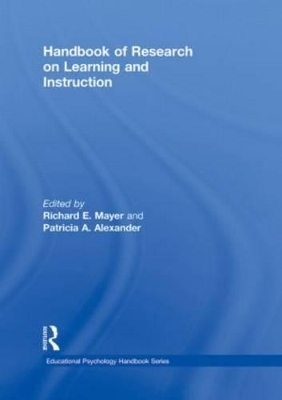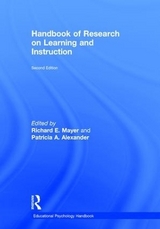
Handbook of Research on Learning and Instruction
Routledge (Verlag)
978-0-415-80460-8 (ISBN)
- Titel erscheint in neuer Auflage
- Artikel merken
The book is divided into two sections: learning and instruction. The learning section consists of chapters on how people learn in reading, writing, mathematics, science, history, second languages, and physical education, as well as learning to think critically, learning to self-monitor, and learning with motivation. The instruction section consists of chapters on effective instructional methods – feedback, examples, self-explanation, peer interaction, cooperative learning, inquiry, discussion, tutoring, visualizations, and computer simulations. Each chapter reviews empirical research in a specific domain and is structured as follows:
Introduction – Defines key constructs and provides illustrative examples or cases.
Historical Overview – Summarizes the historical context for the topic or domain.
Theoretical Framework – Summarizes major models or theories related to the topic or domain.
Current Trends and Issues – Synthesizes the research literature and highlights key findings or conclusions.
Practical Implications – Suggests relevance of the research for educational practice.
Future Directions – Considers next steps or stages needed for future research.
Richard E. Mayer is Professor of Psychology at the University of California, Santa Barbara. Dr. Patricia A. Alexander is the Jean Mullan Professor of Literacy and Distinguished Scholar-Teacher in the Department of Human Development at the University of Maryland.
Preface
Part I. Research on Learning
1. Introduction to Research on Learning, Patricia A. Alexander and Richard E. Mayer
2. Learning to Read, Emily Fox and Patricia A. Alexander
3. Learning to Write, Susan De La Paz and Deborah McCutchen
4. Learning Mathematics, Ann R. Edwards, Indigo Esmonde, and Joseph F. Wagner
5. Learning Science, Richard Duschl and Richard Hamilton
6. Learning History, Linda Levstik
7. Learning a Second Language, Min Wang
8. Learning Motor Skill in Physical Education, Catherine D. Ennis and Ang Chen
9. Learning to Think Critically, Christina Bonney and Robert J. Sternberg
10. Learning to Self-Monitor and Self-Regulate, Marcel V. J. Veenman
11. Learning with Motivation, Eric M. Anderman and Heather Dawson
Part II. Research on Instruction
12. Introduction to Research on Instruction, Patricia A. Alexander and Richard E. Mayer
13. Instruction Based on Feedback, John Hattie and Mark Gan
14. Instruction Based on Examples, Alexander Renkl
15. Instruction Based on Self-Explanation, Brenda A. Fonseca and Michelene T. H. Chi
16. Instruction Based on Peer Interaction, Kathryn R. Wentzel and Deborah E. Watkins
17. Instruction Based on Cooperative Learning, Robert E. Slavin
18. Instruction Based on Inquiry, Sofie M. M. Loyens and Remy M. J. P. Rikers
19. Instruction Based on Discussion, P. Karen Murphy, Ian A. G., Wilkinson, and Anna O. Soter
20. Instruction Based on Tutoring, Arthur C. Graesser, Sidney D’Mello, and Whitney Cade
21. Instruction Based on Visualizations, Richard E. Mayer
22. Instruction Based on Computer Simulation, Ton de Jong
| Erscheint lt. Verlag | 1.2.2011 |
|---|---|
| Reihe/Serie | Educational Psychology Handbook |
| Zusatzinfo | 12 Line drawings, black and white; 14 Tables, black and white |
| Verlagsort | London |
| Sprache | englisch |
| Maße | 178 x 254 mm |
| Gewicht | 1111 g |
| Themenwelt | Geisteswissenschaften ► Psychologie ► Allgemeine Psychologie |
| Geisteswissenschaften ► Psychologie ► Pädagogische Psychologie | |
| ISBN-10 | 0-415-80460-4 / 0415804604 |
| ISBN-13 | 978-0-415-80460-8 / 9780415804608 |
| Zustand | Neuware |
| Informationen gemäß Produktsicherheitsverordnung (GPSR) | |
| Haben Sie eine Frage zum Produkt? |
aus dem Bereich



